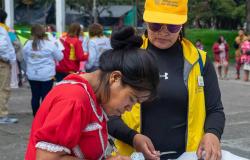Ecuador is experiencing a turbulent legislature. Since the mandate of Ecuadorian President Daniel Noboa began last November, a series of abrupt events have put the Latin American country in the spotlight.
Added to the state of emergency, decreed in January on a national scale, after the spiral of violence suffered in prisons, was the assault on the Mexican embassy in Quito, at the beginning of April, to remove former vice president Jorge Glas from there.
Noboa has been in office for half a year at a forced pace – since the legislature will only last sixteen months – which so far have not served to stop the serious situation of insecurity, drug trafficking and violence that the country suffers.
Given this panorama, Ecuadorians go to the polls on April 21, to vote in a referendum and popular consultation on questions about security proposed by Noboa, in addition to others of an economic nature.
Experts tell DW that, if he is victorious in the consultation, Noboa could argue that he needs more time in power to continue with the necessary reforms in the fight against organized crime.
“His party could capitalize on it for the next presidential elections, in which he will seek re-election,” Glaeldys González, member for Latin America of the International Crisis Group (ICG), told DW.
A referendum to validate
“Noboa has expectations, on the part of the citizens, of improving the insecurity situation, so everything he does politically goes in that direction,” Guillaume Long, principal researcher at the Center for Economic Policy Research (CEPR), explains to DW. its acronym in English), in London.
“He has proposed a popular consultation, a referendum, to do what I would call ‘punitive populism,'” adds Long, referring to the questions presented for this Sunday.
Ecuadorians will have to answer eleven questions, which deal with allowing the support of the Armed Forces in the functions of the National Police, weapons control, increasing penalties for serious crimes, or extradition, among other proposals, according to the information. published by the National Electoral Council (CNE) from the country.
“It appeals to the idea that increasing sentences will deter crime, when the problem is not the number of years in prison but impunity for crimes,” Pablo Ospina, a professor in the Social and Global Studies Area of the Simón Bolívar Andean University.
“The questions of the consultation were not designed to address fundamental solutions to insecurity, but to be politically reinforced with coups de effect,” he adds.
“Embarrassment” from outside
The referendum takes place days after the international “embarrassment” over the raid on the Mexican embassy in Quito, and despite the fact that, internally, Noboa has even improved his reputation, underline the analysts consulted by DW.
“This performance represents exactly the type of unrestricted fight against crime that the people who voted for him expected,” Glaeldys González explains to DW. “The Government was facing a progressive decline in its popularity and, perhaps, this was a strategy to improve its reputation, which has been well received in sectors with anti-correista sentiments,” he adds.
Similarly, Pablo Ospina considers that this action marks the end of “his political dalliances with Correismo”, since Noboa’s party – National Democratic Action (ADN) – had a parliamentary alliance with the Citizen Revolution movement. Its leader, Rafael Correa, was a close friend of Jorge Glas.
“The seizure of the Mexican embassy, in addition to constituting a gigantic embarrassment, marks a clear turn to galvanize the anti-Correísta vote,” insists Ospina.
For Mario Pazmiño, international intelligence and security consultant for Latin America and Europe at the Security College US, Noboa’s image at the national level has been strengthened after the assault. “The country was tired of there being a permanent violation of its integrity and respect for Ecuadorian democracy,” he told DW.
“Trick” questions
The referendum includes two questions that point, on the one hand, to Ecuador’s return to international arbitration as a method to resolve investment disputes and, on the other, to allow hourly work.
“Neither one nor the other has to do with security. But seeing that he had very good chances of winning, Noboa introduced them. It is tricky to do that because they are complex issues and there are many interests,” says Long.
For the expert, reintroducing international arbitration – prohibited in Ecuador by article 422 of its Constitution – is “regrettable” and occurs “not only due to ignorance”, but also due to the specific interests of business groups, “including the Noboa Group”, al which belongs to the president himself, he points out.
The consultation will not solve the insecurity
Some experts describe Noboa’s management of security as “positive”, although new proposals are necessary. For Mario Pazmiño, a “re-engineering of the prison system, the intelligence system and the judicial system is needed, since a large part of the judges work for organized crime,” he assures DW.
According to the Ecuadorian Organized Crime Observatory (OECO) Ecuador closed 2023 with more than 8,004 intentional homicides, with a rate of 47.25 violent deaths per one hundred thousand inhabitants. This places it as the most violent country in Latin America and one of the most violent in the world.
“Crime has not been controlled and this can even take decades,” Gonzalo Ordóñez, a researcher in the Communication Area of the Simón Bolívar Andean University, tells DW. However, with a view to the next elections, the referendum is extremely valuable,” he says, despite all the criticism.
(rml)






